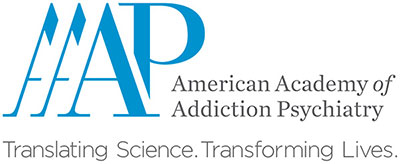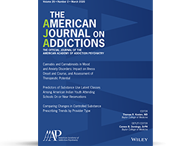Purpose: This resource was created by the American Academy of Addiction Psychiatry (AAAP) Education Committee to assist applicants who are not US citizens and program directors in the fellowship recruitment process when an applicant would need to use a training visa (J-1 or H1-B) to complete an addiction psychiatry fellowship.
Note: Utilization of a visa to complete addiction psychiatry training is a complex process and this guide is not intended to be a comprehensive review of US immigration policies. Instead, this guide is meant to help familiarize applicants and program directors on the basics of training visas and support the recruitment/matriculation of applicants from diverse backgrounds into addiction psychiatry fellowship positions.
*If you encounter any outdated or incorrect information in this document, please email [email protected] so that it can be updated.
J-1 Visa
Purpose:
The J-1 visa is a “nonimmigrant visa” which allows applicants a temporary stay in the United States to participate in educational training. Applicants on a J-1 visa are required to return to their home country for a minimum of 2 years after the completion of their addiction psychiatry fellowship or other training, unless they apply for the following waiver: Waiver of the Exchange Visitor Two-Year Home-Country Physical Presence Requirement. The most common waiver is working in an underserved area for a minimum of 3 years to a maximum of 5 years.
Specifics:
An applicant’s home country must provide a letter of need from the Ministry of Health to allow for a J-1 visa. Applicants are not able to enter the United State more than 30 days prior to fellowship start date on J-1 Visa and must leave the United States within 30 days of completion of the fellowship. The maximum duration of a J-1 Visa is typically 7 years. It is possible to apply for a J-1 Visa to be converted to an H-1B visa after completing fellowship or other training. Spouses may seek employment authorization via a J-2 visa if their partner has a J-1 Visa.
*Since the J-1 Visa process does not traditionally involve additional expense to a sponsoring institution. Most addiction psychiatry fellowship programs accept applicants on J-1 Visas.
*Note most addiction psychiatry fellowship applicants who already have already been granted a J-1 visa to complete their psychiatry residency in the US can utilize said visa for their addiction psychiatry fellowship.
Sponsorship eligibility:
- Pass USMLE step 1 and step 2 CK exams.
- Obtain certification by the Education Commission for Foreign Medical Graduates (ECFMG).
- Hold a contract or an official letter for a position in an addiction psychiatry fellowship program.
- Provide an original statement of need from the Ministry of Health of the applicant’s home country specifically for their addiction psychiatry fellowship. Note: applicants who obtained a statement of need for their general psychiatry residency program will require an additional statement of need for addiction psychiatry fellowship.
Cost to fellowship program: Direct cost is $0, although processing of a J-1 applicants visa/onboarding will require additional administrative steps than an applicant not on a visa
Application Process: detailed information on the J-1 Visa application process can be found here:
https://travel.state.gov/content/travel/en/us-visas/study/exchange.html
https://www.ecfmg.org/evsp/applying-general.html
https://www.ecfmg.org/evsp/applying-checklists.html
H-1B
Purpose:
The H1-B visa is an employer-sponsored (i.e. employer pays fees) nonimmigrant visa which allows applicants entry into the United State to perform services in a specialty occupation (i.e. addiction psychiatry fellowship and clinical practice). The H1-B visa allows the recipient to remain in the United States and practice medicine after completing the fellowship. The visa is initially valid for 3 years and can be extended for an additional 3 years, for a total of 6 years.
Specifics:
The H1-B visa is employer specific and needs to be updated with a change of status if the recipient begins a new job. H1-B visas can be a pathway to a green card. H1-B visa recipients are allowed to moonlight internally, but to moonlight externally the external institution needs to apply for secondary H1-B. Processing time for an H1-B visa can take approximately 5-6 months. Dependents of an H1-B visa recipient can apply for a H-4 visa to enter the United States and can apply for an Employment Authorization Document (EAD) to receive approval to work.
*Since the H1-B visa process results in additional cost and administrative effort to the sponsoring institution, many addiction psychiatry fellowship programs do not have institutional support to accept H1-B visa applicants. A list of addiction psychiatry fellowship programs that currently accept H1-B visas are:
Bronx Healthcare System
Dartmouth University
Emory University
Jefferson University
Mayo Clinic
Medical College of Wisconsin
Mount Sinai- Beth Israel
Boston University Chobanian & Avedisian School of Medicine
Univ of Pittsburgh
University of Kansas
University of Massachusetts
University of Michigan
Harvard University
Yale University
Zucker/Hofstra/Northwell University
Sponsorship eligibility:
- Pass USMLE step 1, step 2 CK, and step 3 exams.
- Obtain certification from the Education Commission for Foreign Medical Graduates (ECFMG).
- Hold a contract or an official letter for a position in an addiction psychiatry fellowship program.
Cost to fellowship program: Direct cost currently is about $5,000-7,000. Processing of a H-1B applicants visa and onboarding often requires additional administrative steps for the sponsoring institution than an applicant not on a visa.
Application Process: detailed information on the H1-B Visa application process can be found here:
https://jobs.cedars-sinai.edu/VISA-Types-H-1B
https://www.aila.org/library/uscis-to-host-webinar-on-h-1b-electronic
“Exceptional Candidate” International Applicants
Purpose:
The American College of Graduate Medical Education (ACGME) allows for “exceptional candidates” who completed psychiatry residency or training equivalent in a non-accredited ACGME institution in another country and have demonstrated “excellence” in addiction psychiatry practice, research, or leadership in their home country prior to entry into the United States to complete an addiction psychiatry fellowship.
Specifics:
Exceptional candidates most commonly enter the United States on a J-1 Visa through the process outlined at the top of this document and then return to their home country after completion of fellowship.
Note: there are applicants who have successfully completed a psychiatry residency in the United States after completing their addiction psychiatry fellowship first.
As the “exceptional candidate” did not complete an ACGME accredited psychiatry residency they are paid at a first-year resident (PGY-I) salary. In addition, they are not eligible for board certification in addiction psychiatry by the American Board of Psychiatry and Neurology and the ACGME requires a certain percentage of fellowship graduates to pass the addiction psychiatry boards for a program to remain in good standing. Finally, the fellowship clinical competency committee (CCC) must review and certify the fellow meets clinical competencies to remain in the fellowship program within the first 12 weeks of training and they may require additional direct supervision at the beginning of fellowship.
Sponsorship eligibility:
- Completed medical school and psychiatry residency or training equivalent in a non-ACGME accredited institution in another country.
- Pass USMLE step 1 and step 2 CK exams.
- Obtain certification by the Education Commission for Foreign Medical Graduates (ECFMG).
- Hold a contract or an official letter for a position in an addiction psychiatry fellowship program. The program director and selection committee must certify that the applicant meets the requirements to complete addiction psychiatry fellowship training. The institutions GME office must also review and approve the applicant. The program director may be required to complete additional documentation by the institutions GME office for approval of the exceptional candidate.
Cost to fellowship program: If J-1 visa no direct cost and if H1-B visa is about $5,000-7,000. Both visas will require additional administrative effort than non-visa applicant.
Reference: ACGME Common Requirements Language for Exceptional Applicants
III.A.1.c).(1) An ACGME-accredited fellowship program may accept an exceptionally qualified international graduate applicant who does not satisfy the eligibility requirements listed in III.A.1., but who does meet all of the following additional qualifications and conditions: (Core)
III.A.1.c).(1).(a) evaluation by the program director and fellowship selection committee of the applicant’s suitability to enter the program, based on prior training and review of the Common Program Requirements (Fellowship) ©2022 Accreditation Council for Graduate Medical Education (ACGME) Page 17 of 50 summative evaluations of training in the core specialty; and, (Core)
III.A.1.c).(1).(b) review and approval of the applicant’s exceptional qualifications by the GMEC; and, (Core)
III.A.1.c).(1).(c) verification of Educational Commission for Foreign Medical Graduates (ECFMG) certification. (Core)
III.A.1.c).(2) Applicants accepted through this exception must have an evaluation of their performance by the Clinical Competency Committee within 12 weeks of matriculation. (Core)
[If Review Committee allows the exception specified above:]
Background and Intent: An exceptionally qualified international graduate applicant has (1) completed a residency program in the core specialty outside the continental United States that was not accredited by the ACGME, AOA, ACGME-I, RCPSC or CFPC, and (2) demonstrated clinical excellence, in comparison to peers, throughout training. Additional evidence of exceptional qualifications is required, which may include one of the following: (a) participation in additional clinical or research training in the specialty or subspecialty; (b) demonstrated scholarship in the specialty or subspecialty; and/or (c) demonstrated leadership during or after residency. Applicants being considered for these positions must be informed of the fact that their training may not lead to certification by ABMS member boards or AOA certifying boards.
In recognition of the diversity of medical education and training around the world, this early evaluation of clinical competence required for these applicants ensures they can provide quality and safe patient care. Any gaps in competence should be addressed as per policies for fellows already established by the program in partnership with the sSponsoring iInstitution.



